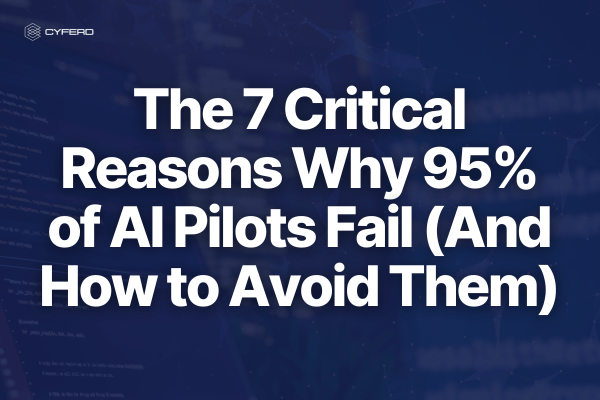Before You Put AI in Government, Maybe Put Down the Spreadsheet

Haider Al-Seaidy
Chief Customer Officer Customer Success
Not long ago, I found myself at a workshop with one of the UK’s big political parties. The topic? Whether rolling out more artificial intelligence in government would make public services better… or worse.
The discussion was prompted by a recent YouGov poll, which showed Brits are… well, let’s say “politely sceptical” about the whole thing. (Especially those who’ve been around long enough to remember when the fax machine was considered cutting-edge.)
Around the table, there was no shortage of big opinions. We hopped between the UK’s position in the “global AI arms race,” the ethics of machine decision-making, how it might reshape the workforce, and much more. It was smart, passionate, and thought-provoking — but mostly very high-level. The kind of debate that sounds fantastic in a panel discussion or on a podcast, but if you’re actually running a government department or a small business, you might be wondering, “OK… but what do I do on Monday morning?”
The conversation often drifted into “big picture” territory: international competition, sweeping economic trends, and how we might measure up against countries that have been investing in AI for decades. All important topics, sure — but a bit like discussing the finer points of Formula 1 engineering when your own car is still up on blocks in the driveway.
I sat back, listening carefully, and waited until the end to share my thoughts. Partly because I wanted to hear everyone else first… and partly because speaking last has the sneaky advantage of sticking in people’s minds.
When my turn came, I spoke from my experience working with both government departments and private companies of all shapes and sizes. And here’s the reality: most organisations aren’t ready for AI to swoop in and magically solve everything. They’re not stuck in the paper-and-ink dark ages, but they are still running major processes in Excel. And don’t get me wrong — I love a good spreadsheet. It’s the Swiss Army knife of office life. But it’s also a bit like running your national transport system on a fleet of bicycles: versatile, yes, but it’s not going to get you into the AI fast lane.
The truth is, before AI can deliver real value, you have to get the basics right: organise your data, streamline your processes, and get your workflows humming. And often, once you do that, people feel like they’ve already implemented AI — because the leap in productivity and efficiency is so dramatic.
It’s only once you’ve built that foundation that AI becomes the game-changer everyone talks about. That’s when you move from simple automation to predictions, smarter decision-making, and maybe even a dash of autonomy. But if you try to leap straight to AI without the groundwork, you’re effectively asking a toddler to sprint a marathon. Before you can run, you really do have to walk.
By the end of the session, the MP chairing the event summed up the discussion, and I couldn’t help but notice a few of my points made the cut. Was it because I spoke last and benefitted from the memory effect? Or was it because I made the most sense in the room? Well… I’ll leave you to decide. But I know which answer I’m going with.
Find out more About Cyferd
New York
Americas Tower
1177 6th Avenue
5th Floor
New York
NY 10036
London
2nd Floor,
Berkeley Square House,
Berkeley Square,
London W1J 6BD
Request a Demo
Comparisons

BOAT Platform Comparison 2026
Timelines and pricing vary significantly based on scope, governance, and integration complexity.
What Is a BOAT Platform?
Business Orchestration and Automation Technology (BOAT) platforms coordinate end-to-end workflows across teams, systems, and decisions.
Unlike RPA, BPM, or point automation tools, BOAT platforms:
- Orchestrate cross-functional processes
- Integrate operational systems and data
- Embed AI-driven decision-making directly into workflows
BOAT platforms focus on how work flows across the enterprise, not just how individual tasks are automated.
Why Many Automation Initiatives Fail
Most automation programs fail due to architectural fragmentation, not poor tools.
Common challenges include:
- Siloed workflows optimised locally, not end-to-end
- Data spread across disconnected platforms
- AI added after processes are already fixed
- High coordination overhead between tools
BOAT platforms address this by aligning orchestration, automation, data, and AI within a single operational model, improving ROI and adaptability.
Enterprise BOAT Platform Comparison
Appian
Strengths
Well established in regulated industries, strong compliance, governance, and BPMN/DMN modeling. Mature partner ecosystem and support for low-code and professional development.
Considerations
9–18 month implementations, often supported by professional services. Adapting processes post-deployment can be slower in dynamic environments.
Best for
BPM-led organizations with formal governance and regulatory requirements.
Questions to ask Appian:
- How can we accelerate time to production while maintaining governance and compliance?
- What is the balance between professional services and internal capability building?
- How flexible is the platform when processes evolve unexpectedly?
Cyferd
Strengths
Built on a single, unified architecture combining workflow, automation, data, and AI. Reduces coordination overhead and enables true end-to-end orchestration. Embedded AI and automation support incremental modernization without locking decisions early. Transparent pricing and faster deployment cycles.
Considerations
Smaller ecosystem than legacy platforms; integration catalog continues to grow. Benefits from clear business ownership and process clarity.
Best for
Organizations reducing tool sprawl, modernizing incrementally, and maintaining flexibility as systems and processes evolve.
Questions to ask Cyferd:
- How does your integration catalog align with our existing systems and workflows?
- What is the typical timeline from engagement to production for an organization of our size and complexity?
- How do you support scaling adoption across multiple business units or geographies?
IBM Automation Suite
Strengths
Extensive automation and AI capabilities, strong hybrid and mainframe support, enterprise-grade security, deep architectural expertise.
Considerations
Multiple product components increase coordination effort. Planning phases can extend time to value; total cost includes licenses and services.
Best for
Global enterprises with complex hybrid infrastructure and deep IBM investments.
Questions to ask IBM:
- How do the Cloud Pak components work together for end-to-end orchestration?
- What is the recommended approach for phasing implementation to accelerate time to value?
- What internal skills or external support are needed to scale the platform?
Microsoft Power Platform
Strengths
Integrates deeply with Microsoft 365, Teams, Dynamics, and Azure. Supports citizen and professional developers, large connector ecosystem.
Considerations
Capabilities spread across tools, requiring strong governance. Consumption-based pricing can be hard to forecast; visibility consolidation may require additional tools.
Best for
Microsoft-centric organizations seeking self-service automation aligned with Azure.
Questions to ask Microsoft:
- How should Power Platform deployments be governed across multiple business units?
- What is the typical cost trajectory as usage scales enterprise-wide?
- How do you handle integration with legacy or third-party systems?
Pega
Strengths
Advanced decisioning, case management, multi-channel orchestration. Strong adoption in financial services and healthcare; AI frameworks for next-best-action.
Considerations
Requires certified practitioners, long-term investment, premium pricing, and ongoing specialist involvement.
Best for
Organizations where decisioning and complex case orchestration are strategic differentiators.
Questions to ask Pega:
- How do you balance decisioning depth with deployment speed?
- What internal capabilities are needed to maintain and scale the platform?
- How does licensing scale as adoption grows across business units?
ServiceNow
Strengths
Mature ITSM and ITOM foundation, strong audit and compliance capabilities. Expanding into HR, operations, and customer workflows.
Considerations
Configuration-first approach can limit rapid experimentation; licensing scales with usage; upgrades require structured testing. Often seen as IT-centric.
Best for
Enterprises prioritizing standardization, governance, and IT service management integration.
Questions to ask ServiceNow:
- How do you support rapid prototyping for business-led initiatives?
- What is the typical timeline from concept to production for cross-functional workflows?
- How do licensing costs evolve as platform adoption scales globally?
